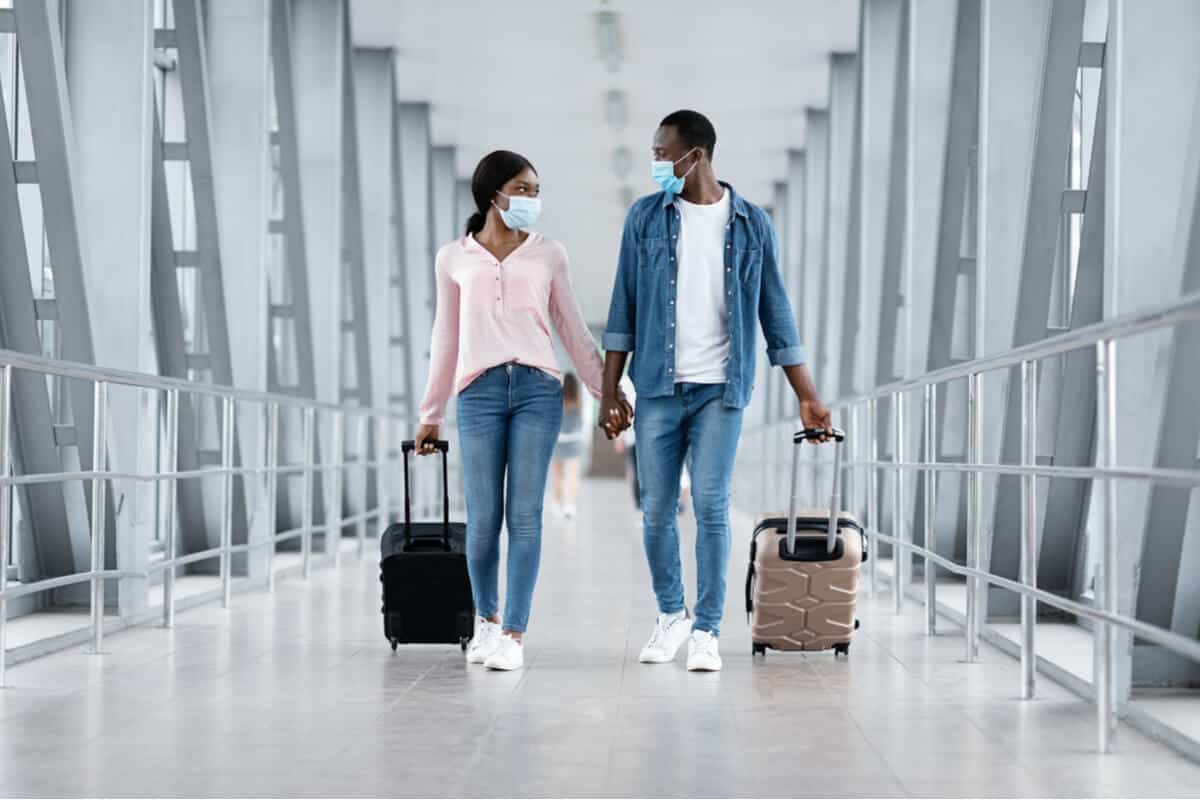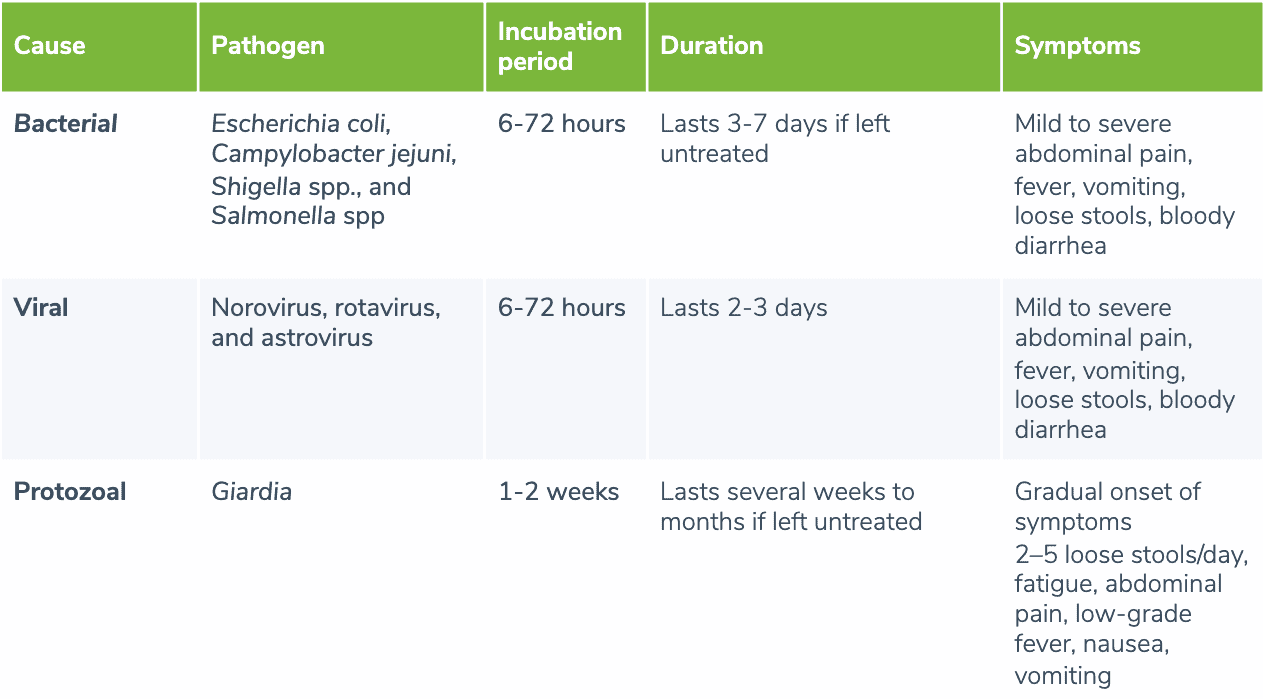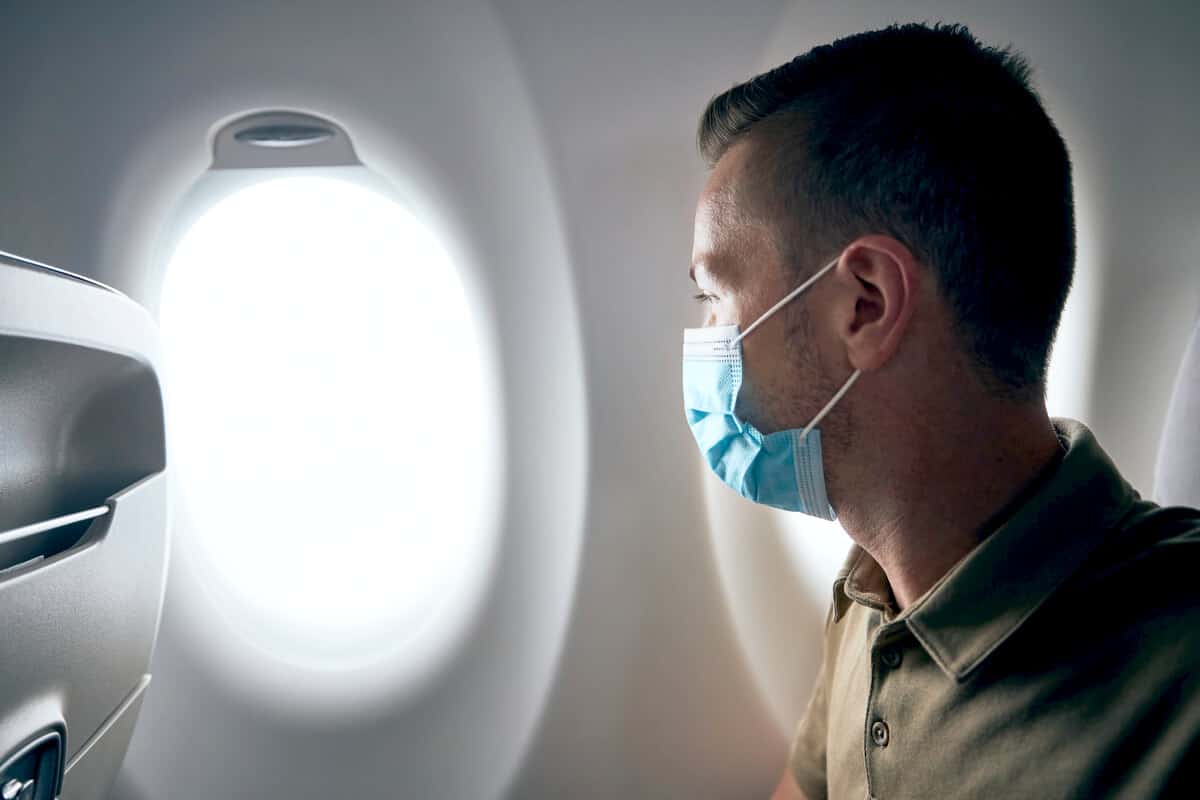
Washing your hands frequently, getting enough sleep, and managing your stress levels can help keep you healthy while traveling.
Why do we get sick when traveling?
It’s not uncommon to experience gastrointestinal distress or to catch a respiratory illness during or shortly after traveling. According to a cohort study involving 460 subjects, 79% of participants reported illness during travel or following their trip. (31) Several factors increase your risk of getting sick while away from home, such as travel-related stress, jet-lag, and contaminated food. (14)(2) Crowded public settings, such as airplanes, buses, trains, restaurants, and public restrooms, can also expose you to pathogens that can increase your risk of illness.Did you know? The flu and other airborne viruses can travel up to six feet once an infected individual coughs, sneezes, or speaks. (4)
Air travel and immune system health
With large crowds of people and close seating arrangements, air travel presents unique risks that can compromise immune system function and increase the likelihood of transmission of infectious diseases. (15) Thankfully, modern air filtration systems in today’s passenger planes allow for constant airflow and are equipped with high-efficiency particulate air (HEPA) filters, which are the same filters used in hospital operating rooms. (17) These filters do not eliminate the risk of catching an airborne illness; however, they are recommended by the Centers for Disease Control and Prevention (CDC) as a highly effective countermeasure. (17) The most significant concern of air travel is the low humidity levels in airplane cabins. Low humidity can cause the mucosa in the nose to dry up, increasing your susceptibility to airborne diseases like the flu. (21)(24)What are the most common illnesses while traveling?
Travelers’ diarrhea (TD) is the most common illness affecting travelers, particularly when traveling abroad. Caused by a wide variety of intestinal pathogens (e.g., bacteria, viruses, protozoa), TD affects between 30% and 70% of travelers. Symptoms of TD vary depending on the type of intestinal pathogen. (6) Travelers can contract TD anywhere; however, certain destinations pose a significantly greater risk, including Asia, Africa, Mexico, the Middle East, and Central and South America. (6) You can reduce your risk by washing your hands frequently, avoiding buffets, choosing hot and cooked foods instead of raw foods, and drinking beverages from factory-sealed bottles. (6) The table below outlines the three causes of TD.
Know the signs and symptoms of travelers’ diarrhea.
Travel health tips
Use the tips outlined below to help prevent illness before, during, and after traveling.Get plenty of sleep
In the days and weeks leading up to your trip, be sure to get at least seven to eight hours of sleep per night. According to one study, not getting enough quality sleep in the weeks before exposure to the virus that causes the common cold (rhinovirus) increases one’s susceptibility to getting sick. (13) If you are traveling to a different time zone and are suffering from jet lag, supplementing with melatonin may help ease symptoms associated with the time change and promote a better night’s sleep. (18)Eat a healthy diet rich in immune-boosting foods
Consuming a healthy diet year-round is essential for building and maintaining a healthy immune system. Poor nutritional status can impair your immune system, leaving you more vulnerable to infection. (22) Several nutrients and dietary components, including fiber, omega-3 fatty acids, zinc, and vitamins A, C, D, and E, support optimal immune function. (12) Focus on consuming various fruits and vegetables, whole grains, beans, legumes, nuts, seeds, and lean protein. (19)Get active
Regular physical activity positively influences your immune health by increasing the circulation of numerous immune cells responsible for combating pathogens. (30) Try to remain physically active while traveling by walking daily, utilizing hotel gyms, biking, or engaging in other physical activities at your destination.Practice proper hygiene
Avoiding touching your face and frequently washing your hands can help minimize your risk of catching or spreading an illness. Using hand soap, wash your hands under warm water for at least 20 seconds. (10) If you’re not near a sink, use an alcohol-based hand sanitizer with at least 60% alcohol to reduce some of the microbes on your hands. (7) Hand sanitizer doesn’t kill bacteria instantly; it can take between 15 and 30 seconds to take full effect. The efficacy of hand sanitizer also depends on the volume you use. Apply enough to cover the entire surface of both your hands and rub your hands together until they are dry. (20)Did you know? The combination of proper hand hygiene and wearing a mask has been shown to decrease the chance of contracting influenza by up to 75%. (1)
Manage stress
Traveling, whether it be for work or leisure, can be stressful at times. Stress can weaken the immune system, leaving you more vulnerable to getting sick. (23) Engage in activities that help relieve stress and calm nerves, such as yoga, meditation, listening to music, or reading.Use immune-supportive supplements when directed by your practitioner
Studies have indicated that certain dietary supplements may help give your immune system a fighting chance against respiratory illnesses. For example, according to one study, echinacea was shown to reduce the severity and occurrence of lower respiratory illness symptoms compared to placebo when taken before and during overseas travel. (27) In another study, elderberry supplements reduced the duration and severity of cold symptoms in air travelers. (28) Always consult your practitioner before adding a new supplement to your wellness plan. For more information about improving your immune system health with lifestyle habits and supplements, visit the Fullscript blog.Confirm with your practitioner that it’s safe for you to travel
If you have certain chronic or acute illnesses, air travel might not be a safe option for you or other passengers. Avoid travel or consult your practitioner before traveling if you are experiencing any of the following symptoms or conditions:- Blood clots or history of deep vein thrombosis (DVT) or pulmonary embolism (PE)
- Chest pain
- Contagious illness (e.g., cold, flu)
- Fever over 100.4°F (38°C)
- Pregnancy (≥36 weeks or high-risk pregnancy)
- Recent heart attack or stroke
- Recent surgery
- Severe chronic respiratory disease
- Severe sinus infection
- Sickle cell disease
- Uncontrolled psychotic illness (5)

Wearing a mask and washing your hands can help reduce the spread of respiratory illness.
Check if your destination requires certain vaccinations
In an effort to prevent international infectious disease spread, some countries have vaccination requirements for visitors. The CDC and the World Health Organization (WHO) provide vaccination requirement information for travelers online. (3)(32) If you are planning to travel internationally, speak to your integrative healthcare provider for guidance.Refer to the CDC for the latest travel advisories
The CDC website offers detailed recommendations and warnings for traveling abroad to countries that may be affected by disease outbreaks, natural disasters, or events that could impact your travel. (11)Bring essential medications and supplements
Don’t forget to pack an adequate supply of medications or supplements. It’s also a good idea to pack a few extra days worth of medications or supplements in the event of a travel delay or trip extension. Keep medications in their original packaging with their labels intact. If you’re traveling abroad, refer to your destination’s foreign embassy to ensure that your medications are allowed in their country. (29)Protect your skin
Be sure to pack sunscreen and protective clothing, such as hats and sunglasses, to protect your skin from the sun’s ultraviolet (UV) rays. Look for sunscreens that offer a minimum of 15 SPF and be diligent about reapplying sunscreen every two hours or after swimming or sweating. Further reduce your exposure by seeking out shady spots while lounging by the pool or spending extended periods of time outdoors. (8)Ease travel-related constipation
Disruptions in your daily schedule, increased stress, and dehydration can cause constipation while traveling. Find relief by drinking plenty of water, eating fiber-rich foods, and staying physically active. Fiber supplements can help ease constipation as well. (25)Consider travel health insurance if traveling abroad
Depending on your medical insurance plan and vacation destination, you may not be covered for medical care when visiting other countries. Travel insurance can be used to cover unexpected accidents or medical costs while you’re traveling. When planning your trip, discuss your insurance coverage and consider purchasing short-term supplemental insurance if necessary. (9)The bottom line
Getting sick doesn’t have to be a part of your trip. With a bit of preparation, certain precautions, and lifestyle modifications, you can reduce your risk of illness while traveling. Be sure to adhere to current travel advisories and any recommendations from your government or public health agency. If you’re a patient, speak to your integrative healthcare provider for a pre-travel check-up and recommendations specific to your wellness plan.- Aiello, A. E., Perez, V., Coulborn, R. M., Davis, B. M., Uddin, M., & Monto, A. S. (2012). Facemasks, hand hygiene, and influenza among young adults: A randomized intervention trial. PLoS ONE, 7(1), e29744.
- Castanon-Cervantes, O., Wu, M., Ehlen, J. C., Paul, K., Gamble, K. L., Johnson, R. L., Besing, R. C., Menaker, M., Gewirtz, A. T., & Davidson, A. J. (2010). Dysregulation of inflammatory responses by chronic circadian disruption. The Journal of Immunology, 185(10), 5796–5805.
- Centers for Disease Control and Prevention. (n.d.). Travelers’ health. https://wwwnc.cdc.gov/travel
- Centers for Disease Control and Prevention. (2018). How flu spreads. https://www.cdc.gov/flu/about/disease/spread.htm
- Centers for Disease Control and Prevention. (2019a). Before you travel tips. https://wwwnc.cdc.gov/travel/page/before-travel
- Centers for Disease Control and Prevention. (2019b). Travelers’ diarrhea. CDC.Gov. https://wwwnc.cdc.gov/travel/page/travelers-diarrhea
- Centers for Disease Control and Prevention. (2020a). Show me the science | Handwashing. https://www.cdc.gov/clean-hands/data-research/facts-stats/index.html
- Centers for Disease Control and Prevention. (2020b). Sun Safety | Skin Cancer | CDC. https://www.cdc.gov/skin-cancer/sun-safety/index.html
- Centers for Disease Control and Prevention. (2020c). Travel insurance: Peace of mind while you travel. https://wwwnc.cdc.gov/travel/page/insurance
- Centers for Disease Control and Prevention. (2021a). Handwashing: Clean hands save lives. https://www.cdc.gov/handwashing/index.html
- Centers for Disease Control and Prevention. (2021b). Travel health notices. https://wwwnc.cdc.gov/travel/notices
- Childs, C.E., Calder, P.C., & Miles, E.A. (2019). Diet and immune function. Nutrients, 11(8), 1933.
- Cohen, S., Doyle, W. J., Alper, C. M., Janicki-Deverts, D., & Turner, R. B. (2009). Sleep habits and susceptibility to the common cold. Archives of Internal Medicine, 169(1), 62.
- Connor, B.A. (2020). Travelers’ diarrhea. CDC.Gov. https://wwwnc.cdc.gov/travel/yellowbook/2020/preparing-international-travelers/travelers-diarrhea
- Edelson, P.J., Kozarsky, P.E., Brown, C. (2020). Air travel. CDC.Gov. https://wwwnc.cdc.gov/travel/yellowbook/2020/travel-by-air-land-sea/air-travel
- Fairley, J.K. (2020). General approach to the returned traveler. https://wwwnc.cdc.gov/travel/yellowbook/2020/posttravel-evaluation/general-approach-to-the-returned-traveler
- Federal Aviation Administration. (2020). Fact sheet – cabin air quality. https://www.faa.gov/newsroom/cabin-air-quality-0
- Herxheimer, A., & Petrie, K. J. (2002). Melatonin for the prevention and treatment of jet lag. Cochrane Database Syst Rev, 2, CD001520.
- Iddir, M., Brito, A., Dingeo, G., Fernandez Del Campo, S. S., Samouda, H., La Frano, M. R., & Bohn, T. (2020). Strengthening the immune system and reducing inflammation and oxidative stress through diet and nutrition: Considerations during the COVID-19 crisis. Nutrients, 12(6), 1562.
- Kampf, G., Ruselack, S., Eggerstedt, S., Nowak, N., & Bashir, M. (2013). Less and less–influence of volume on hand coverage and bactericidal efficacy in hand disinfection. BMC Infectious Diseases, 13(1), 472.
- Kudo, E., Song, E., Yockey, L. J., Rakib, T., Wong, P. W., Homer, R. J., & Iwasaki, A. (2019). Low ambient humidity impairs barrier function and innate resistance against influenza infection. Proceedings of the National Academy of Sciences, 116(22), 10905–10910.
- Maggini, S., Pierre, A., & Calder, P. (2018). Immune function and micronutrient requirements change over the life course. Nutrients, 10(10), 1531.
- Morey, J. N., Boggero, I. A., Scott, A. B., & Segerstrom, S. C. (2015). Current directions in stress and human immune function. Current Opinion in Psychology, 5, 13–17.
- Morse, R. P. (2013). The effect of flying and low humidity on the admittance of the tympanic membrane and middle ear system. Journal of the Association for Research in Otolaryngology, 14(5), 623–633.
- National Institute of Diabetes and Digestive and Kidney Diseases. (2021). Symptoms & causes of constipation. https://www.niddk.nih.gov/health-information/digestive-diseases/constipation/symptoms-causes
- Okhuysen, P. C. (2001). Traveler’s diarrhea due to intestinal protozoa. Clinical Infectious Diseases, 33(1), 110–114.
- Tiralongo, E., Lea, R. A., Wee, S. S., Hanna, M. M., & Griffiths, L. R. (2012). Randomised, double blind, Placebo-Controlled trial ofEchinaceaSupplementation in air travellers. Evidence-Based Complementary and Alternative Medicine, 2012, 1–9.
- Tiralongo, E., Wee, S., & Lea, R. (2016). Elderberry supplementation reduces cold duration and symptoms in Air-Travellers: A randomized, Double-Blind Placebo-Controlled clinical trial. Nutrients, 8(4), 182.
- U.S. Department of State. (2019). Your health abroad. https://travel.state.gov/content/travel/en/international-travel/before-you-go/your-health-abroad.html
- U.S. National Library of Medicine. (2021). Exercise and immunity. https://medlineplus.gov/ency/article/007165.htm
- Vilkman, K., Pakkanen, S. H., Lääveri, T., Siikamäki, H., & Kantele, A. (2016). Travelers’ health problems and behavior: Prospective study with post-travel follow-up. BMC Infectious Diseases, 16(1), 328.
- World Health Organization. (2019). Vaccines. https://www.who.int/travel-advice/vaccines





